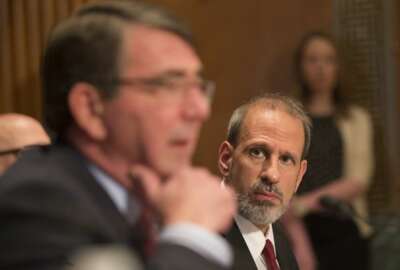

Senate Armed Services Committee Chairman John McCain (R-Ariz.) laid the weight of DoD's first audit squarely on the shoulders of David Norquist, President Trump's...
The Defense Department has less than five months to meet its deadline to be audit ready, so the incoming Under Secretary of Defense (Comptroller) and his team have their work cut out for them. Both lawmakers and the nominee himself made it a point to address that immediately during the Senate Armed Services Committee hearing on President Donald Trump’s pick for the post.
“Twenty-seven years ago, the Chief Financial Officers Act was passed, and to this day, the department of Defense is still not auditable. The department of defense is the only department in the federal government which has failed to meet this mandate,” committee Chairman John McCain (R-Ariz.) said in his opening statement at the May 10 hearing. “This has been a very public continuing failure for the department due to a failure of senior management to make this a priority for the department and invest the necessary time and will to get it done. This must end with you, Mr. Norquist and Ms. McCusker.”
David Norquist is the President’s nominee for the DoD comptroller position. He was formerly the chief financial officer at the Homeland Security Department, and oversaw DHS’ first audit. Elaine McCusker is the nominee for principal deputy undersecretary of Defense.
“Let me address it directly: it is time to audit the Pentagon. For seven years or more, the department has engaged in audit readiness, preparing for a full-scope audit without starting it. This approach has diminishing returns,” Norquist said. “I recognize it will take time for the department to go from being audited to passing an audit. Everything you have heard about the size and complexity of the department is true. And this legitimately makes any endeavor, including an audit, harder. But that is not a reason to delay the audit. That is a reason to begin.”
Before Norquist became CFO at DHS in 2006, the department had never passed an audit. It’s now achieved four consecutive clean opinions. The only real difference between DHS and DoD, Norquist said, is that DHS didn’t have a choice; the audit had already started.
Norquist and McCusker agreed that the most important thing is to actually start the audit immediately, rather than waiting until DoD is confident it can pass.
“Not starting the audit because you’re afraid of what it might find is like not going to the doctor because you’re afraid what he might say. It does not make problems better,” said Sen. Elizabeth Warren (D-Mass.).
But this perspective also stems from a lack of experience with audits. Norquist said DoD officials view auditors coming back in a year as a problem, whereas those with experience in audits take a different outlook, which helps things run more smoothly.
The other commonly expressed major barrier to starting the audit is DoD’s size and complexity as an organization.
“If you look at the size and complexity issue, my point, coming from the business world, is if you look at it, the Department of Defense is only a little larger than Wal-Mart,” said Sen. David Perdue (R-Ga.). “I can’t imagine Wal-Mart calling the [Securities and Exchange Commission] or any other agencies and saying, ‘We’re too large and complex to file our documents this quarter.'”
Norquist said one successful strategy is to break down the accountability to the smallest level where people actually have the authority to make changes. At DHS, as these groups were consistently held accountable, their peers began to improve their efforts to comply as well.
Finally, DoD’s systems present a significant challenge to the audit.
“To get a clean audit, you have to have an accounting system that actually works. That’s my concern: that we don’t have an accounting system in the DoD that actually works,” said Sen. Joni Ernst (R- Iowa).
But the problem isn’t quite as simple as a broken system.
“The first challenge is there are a large number of accounting systems at the Department of Defense,”
Norquist said. “It’s not essential to get down to one, but getting down to a small number would be a step in the right direction.”
This was also one of the main priorities for Robert Daigle, the nominee for director of the Office of Cost Assessment and Program Evaluation at DoD. He said there are too many legacy systems that simply don’t talk to one another, and that these disparate data structures mean someone has to manually collect and translate the data when moving from one system to another. Consolidating these systems into a single, enterprisewide system would allow the department a centralized view of the accounting.
“That’s the kind of attitude and foresight we’re looking for,” Ernst said.
McCain pointed out that until the audit is finally completed, it will be impossible to tell how much money is being spent by DoD, and on what. And that, despite the focus of the hearing, is the primary responsibility of all three positions.
“It seems to me that none of the three of you can do your job unless you have a handle on how much money is being spent,” he said.
Copyright © 2025 Federal News Network. All rights reserved. This website is not intended for users located within the European Economic Area.
Daisy Thornton is Federal News Network’s digital managing editor. In addition to her editing responsibilities, she covers federal management, workforce and technology issues. She is also the commentary editor; email her your letters to the editor and pitches for contributed bylines.
Follow @dthorntonWFED


